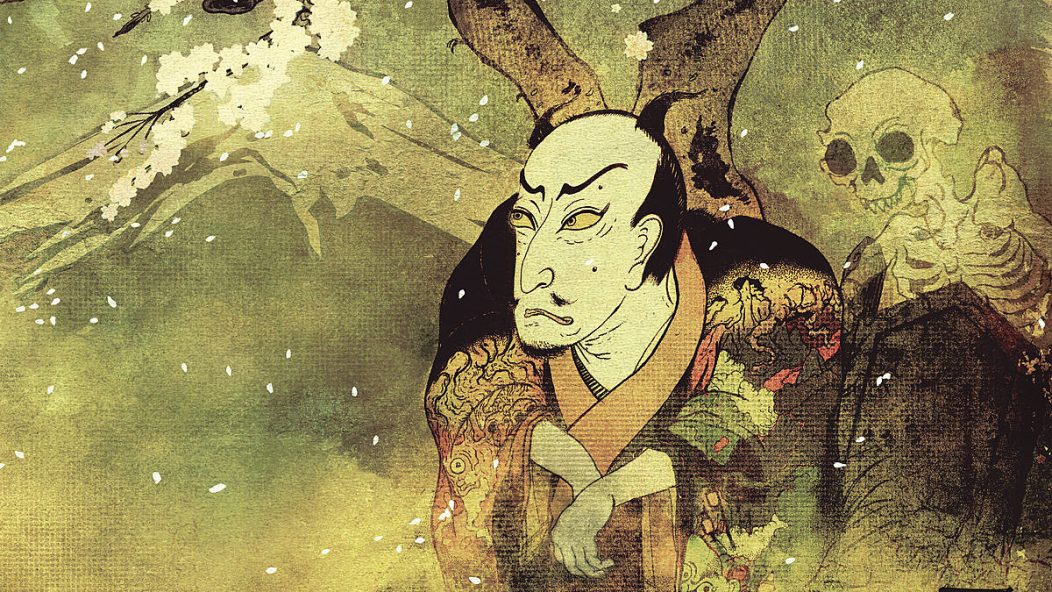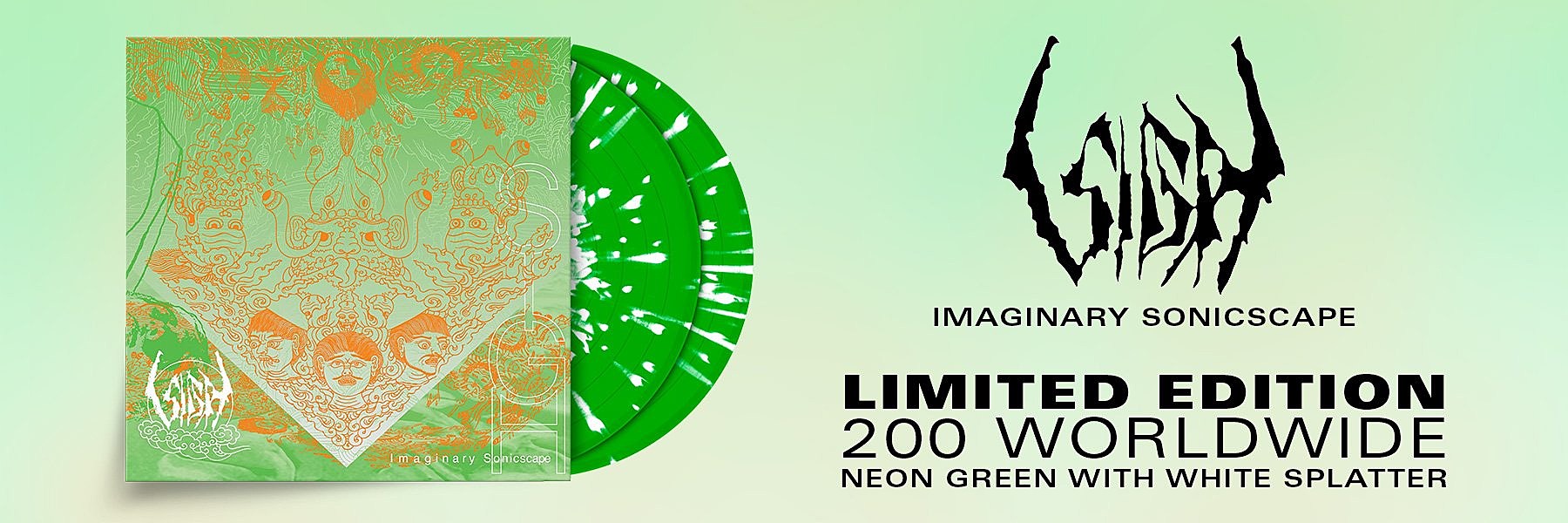
Sigh Push Boundaries and Reflect on Life's Passing On "Shiki" (Interview)
The cult Japanese black metal band Sigh has been surging for 32 years by continuously pushing the boundaries within the genre. Led by Sigh mastermind Mirai Kawashima (vocals/keyboards) and his wife Dr. Mikannibal (vocals/saxophone), completed by Satoshi Fujinami (bass) and guests Mike Heller (drums) and Frédéric Leclercq (guitars), the band creates a mesmerizing concoction of classical, symphonic, progressive, and black metal music on its 12th full-length album Shiki. The band has always incorporated a potpourri of exotic and traditional oriental instruments to achieve their uniqueness, such as various flutes, as well as the saxophone, a real orchestra and choir in Sigh’s music.
On Shiki, the band has based the album’s theme on an ancient Japanese poem with accompanying cover art. Sung in their native tongue, its 10 tracks are a conscious effort on Mirai’s part to represent and capture the essence of Japanese culture. Entering his fifth decade of existence, Mirai wanted to reflect on his life and express his feelings of impending death. In the following interview Mirai explains what the early days of the band were like, the new album, his lyrical inspiration and other subjects.
..
..
Sigh has been going strong for 32 years and is still pushing the boundaries within the black-metal scene. Since your 1990 formation, what did you set out to create or accomplish when you first started the band?
Actually we never were an ambitious band. I never thought we’d be able to release an album. I never even thought about playing at big European festivals. Back in 1990, there were no Japanese extreme metal bands that were internationally recognized, so just making some demos and doing local shows were everything to us. Also, I didn’t think I’d be still in a band when I became 30. Back then everybody from Slayer to Venom were in their 20s and it wasn’t easy to picture that you were still playing extreme music when you were 30. Well, now I am 52 though.
How were those early days of the band in Japan? Was it difficult to find local shows, trying to sell merch, finding venues, recording standards compared to the opportunities you have now with recording techniques and bigger distribution?
The biggest problem was that everybody was enthusiastic about death metal / grind back then and nobody cared about bands influenced by 80s thrash metal. Probably Abigail was the only band that shared the same vision with us. And yes, the recording was expensive! It was all analog and the studio was very pricey, and of course there was no way to record your parts in your bedroom. Luckily Wild Rags were taking care of distributing our demos, so the distribution wasn’t a problem for us.
With the new 12th full-length album Shiki, I believe the word itself has various meanings in Japanese. Are the two primary themes for the album “four seasons” and “time to die”?
Now I am 52 and death is obviously the biggest threat to me. Unfortunately some of my friends started dying and I just lost my dad last month. Surely Sigh have been handling death even from the very beginning but it is just a fictional horror when you’re 20. Of course you could die any time, but still you cannot take death as something very real when you are young. This time I wanted to express my honest feelings about my fear of death. And if life has four seasons, I must be in late Autumn now. And after this, only Winter comes. No spring or summer will return, you know.
The concept and artwork is based around a traditional Japanese poem. Is this a true concept album? Please discuss how the cover artwork, title, and songs all tie together.
Yes, the artwork is based on an old Japanese poem from 800 – 900 years ago. It describes the scene where an old man watches the cherry blossoms being blown off by the strong spring storm. The cherry blossoms are very beautiful but at the same time it is a symbol of fragility to the Japanese people because they are gone in 4 – 5 days. It implies that your heyday is short. In the poem, the old man identifies the petals in the wind with himself, who is senile and has to die quite soon. I was really impressed with this. Our lives drastically changed over these 800 – 900 years, however our fear of getting old or fear of death stays the same. No matter how science evolved, we still have to have those fears.
I wouldn’t call it a concept album because 2 songs, “Satsui” and “Mayonaka No Kaii” are off topic. “Satsui” is about death penalty. It’s very easy to say that “The criminal penalty is not for revenge. We all live in a country governed by law”, but are things that simple? I’ll explain about “Mayonaka No Kaii” later. All other songs are about my personal fear of getting old / fear of death.
What was your mindset while writing these tracks? Where did your lyrical inspiration or motivation come from?
I didn’t need any inspiration from outside this time as all I had to do was to unleash my fear I was feeling everyday. Being over 50 is not easy. You are obviously getting weaker both physically and mentally. You gain a lot when you are young, but you have to lose a lot when you are 50. As I told you, I never thought I’d be still in a band when I was 30 because extreme metal was born as music for the young people back then. I always wonder what is the point in making an extreme metal album when you are as old as 50. In that sense, ‘Shiki’ may be an answer to my own question.
How did you come to the decision on singing all the songs in Japanese for this album?
I needed to use my own language to express my fear of getting old and fear of death as honestly and straightforwardly as possible. And as I told you, the old Japanese poem was one of the triggers, so I wanted to make an album that had a strong Japanese mentality. Thus, everything from music, lyrics to artwork had to be very Japanese this time.
The song/video “Mayonaka No Kaii” is based on an experience you had I believe, can you discuss the lyrical theme and how the song is so diverse?
Yes, it is based on my strange experience. Long story short, I experienced midnight twice in one night. You can read the details at the end of the video or in the booklet of the album. And yes, the song is very much diverse. It’s got everything from guitar solo, flute solo, shakuhachi solo, Hammond solo to vocoder and ethnic singing. I always want to write songs like “Bohemian Rhapsody,” which got a lot of scenes but still it’s only 5 min long.
The album utilizes a whole host of instruments including traditional oriental instruments such as the Shakuhachi and Sinobue flutes. You’ve used many different instruments (especially the sax) as well as a real orchestra before in Sigh’s music. To see you’re still experimenting with different instruments is compelling, admirable and satisfying. How do you go about composing with and introducing these different instruments?
My way of composing songs is always the same. First I program them on MIDI and keep listening to them to see what they require. And then I keep re-arranging them until I am 100% satisfied with how they sound. There’s no formula or anything. All I can rely on is my ears. This time I wanted to make it a very Japanese album both musically and lyrically, so I wanted to use a lot of Japanese traditional instruments. The only rule I went by was to play all of them myself. Surely we used some other “unusual” instruments before such as saxophones or sitar, but if you look at rock music, these instruments are nothing unusual. Saxophones were rather a basic instrument in the ’50s. If you listen to “Never Ending Story” carefully, you’ll notice that sitar is used, but people wouldn’t call it avant-garde or anything. What we’re doing was already tried and done for so many years. We’re rather a conservative band.
Joining you and Dr. Mikannibal for this release are Frédéric Leclercq of Kreator, plus US drummer extraordinaire, Mike Heller of Fear Factory and Raven, along with an appearance by longtime member Satoshi Fujinami on bass. What’s the band camaraderie and musical chemistry like between the members currently and what did each member contribute musically? As a drummer myself, I’m especially impressed with Mike’s performance!
I started writing the songs for the album in early 2020 and it was also the beginning of the Pandemic. Back then Covid seemed like a really scary virus and I didn’t think it’d be possible to gather around a closed place like a music studio, so I asked Mike to play drums for us as I knew he had his own studio and could do everything himself. Also it is true that I wanted to make an album with musicians who have no technical limitations. Now I am 52 and I am not sure how many more albums I can make for the rest of my life, and I didn’t want to get frustrated with this kind of limitation. After Mike finished up his parts, our own guitarist was supposed to follow, but somehow he started acting strange. He was really slow in answering emails and even if he sent the files, they sounded quite horrible, so I had to let him go. I’ve known Fred for a long time. He likes Japan and often visits here, and whenever he’s here, we hang out together. And of course he’s a great guitarist, he was the obvious choice for me when I found out that our guitarist wasn’t capable of it.
Mike’s contribution is very obvious, isn’t it? Definitely this album has by far the best drum performance in Sigh’s works. Also Fred’s guitar works are brilliant. You can hear a lot of truly impressive guitar leads. Honestly, our ex-guitarist was really bad at writing solos, so Graveward and Heir to Despair lacked great guitar moments.
Shiki was recorded across multiple studios and mixed and mastered by Lasse Lammert at LSD studios in Germany. How did you go about constructing the songs and then recording, since geographically not all members live in the same area.
Basically I programmed all the songs on MIDI and sent them to Mike and Fred so that they could learn the songs. They both are very much used to this kind of recordings, so it was much much easier than gathering in the studio and showing other members how to play etc. Actually, Mike introduced me to Lasse. They have been working together a lot, so Lasse completely knew how to handle the complicated drumming by Mike.
Lastly Mirai, what’s next for Sigh, including upcoming touring plans?
We will play in Czech and Mexico this summer. Also now we’re talking about some touring for the rest of this year and next year. Right now things are really unstable due to the pandemic and the war, but we’re figuring out how to make things happen.
Shiki will release on August 26th, 2022 via Peaceville Records. Grab a copy on vinyl, and grab a copy of their 2001 classic Imaginary Sonicscape on limited splatter vinyl.












